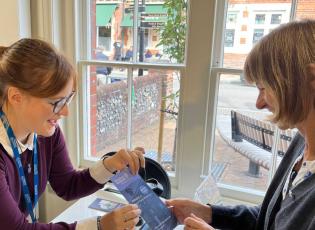Established in the throws of the COVID-19 pandemic the Edward Thomas Literary Festival inaugural year was held completely digitally!
This three-day digital event (1st-3rd October) looks at the life and work of Edward Thomas. It will expand and explore not only his own literary work but how he has inspired others. His love of nature and his sense of place and belonging will also be studied.
Translating Thomas: Join Marie-Marthe Gervais, archivist for The Edward Thomas Fellowship and university lecturer, as she introduces former Portsmouth University lecturer and colleague Vladimir Fisera who will look at the joys and challenges of translating Edward Thomas's poetry into a foreign language.
Welcome to the Edward Thomas Fellowship: This video welcomes you to the Edward Thomas Fellowships day of the festival and gives a short potted history of the fellowship.
Edward Thomas as the Superfluous Man: This talk considers Thomas's depiction of himself in his autobiographical prose and poetry as a 'superfluous man' in the light of new ideas about social welfare during the late 19th and early 20th century.
A Gathering of Poets: Join poets Daljit Nagra, Yvonne Riddick, Matthew Hollis and Zaffar Kunial for a vibrant session of poetry readings and an exploration of what Edward Thomas means to them and their work.
2 Poets, 1 Conversation - Andrew Motion and Michael Longley: 'Eaves drop' on the conversation between two old friends and multi award winning poets, Andrew Motion and Michael Longley. This event brings the two friends together in the digital world we currently find ourselves in. Be inspired as they talk about their poetry and of course Edward Thomas and his influence on them over the years as well as topics of the day, such as poetry in schools.
Thomas and Frost - An Inspirational Friendship: Join us, along with The Edward Thomas Fellowship and our American friends from the Robert Frost Society to explore the friendship that inspired two of the 20th centuries most beloved poets. This is a story about two men at the beginnings of their careers confiding in one another about their deepest hopes and aspirations for their art, told through the study of their personal correspondence over the life of their short lived friendship.
'I Remember Arras' and readings from Agney: A unique session for the Edward Thomas Literary festival featuring a new peice of work from Adrien Garfe, 'I Remember Arras' and readings from Edward Thomas's grave at the Agney cemetary presented by Andrew McKeown
The Plant-Whisperer - An Eco-Story: In this extended poetic monologue, a self-confessed plant-whisperer shares a fictional elegy to a house-plant, radio drama-style, offering a sinister and surreal insight into the side-effects of self-isolation. Using a device that is able to perceive the electromagnetic waves from the surface of plants and translate these into pitch, the story is accompanied by an ambient musical backdrop that allows the plant to sing. Tune into the inner world of plants and use it as a springboard for thinking and writing poetically about your own connection to nature.
Sad Songs of Autumn Mirth - Edward Thomas, Nature and Mental Health:
This talk explores the relationship between nature and mental health in the poetry of Edward Thomas and reflects on the contemporary relevance of the poet's treatment of this subject. Throughout his life Edward Thomas suffered from severe bouts of depression that he examined with unflinching honesty in his poems. Thomas’s mental health was intimately connected with the need for deep engagement with the natural world as a way to ease his suffering. This talk will draw upon close readings of the poems to consider how nature helped Edward Thomas’s mental health, the extent of its impact on his wellbeing and the lessons his poetic reflections on the subject can offer to contemporary understanding of this complex illness.
Places of Inspiration - Identifying the places that inspired Edward Thomas:
Discover some of the locations that inspired the work of poet, Edward Thomas. Some of the locations of Thomas's poems are obvious, others have been identified through the poet’s writings and some may be composite or imaginary landscapes. However there are a number of poems where more precise identification is possible drawing on his extensive writings and observations, including his field note books and letters, and other contemporary sources as well as by walking the ground.


